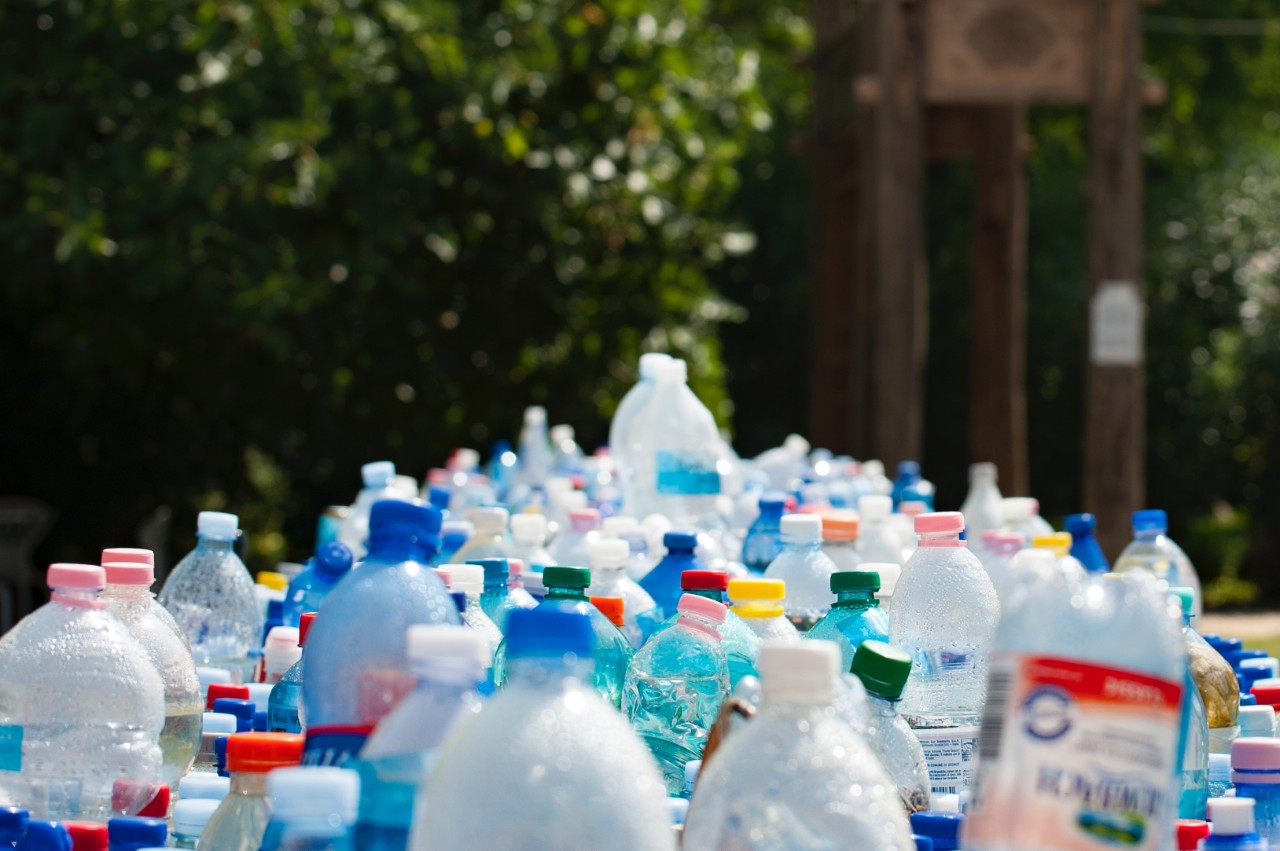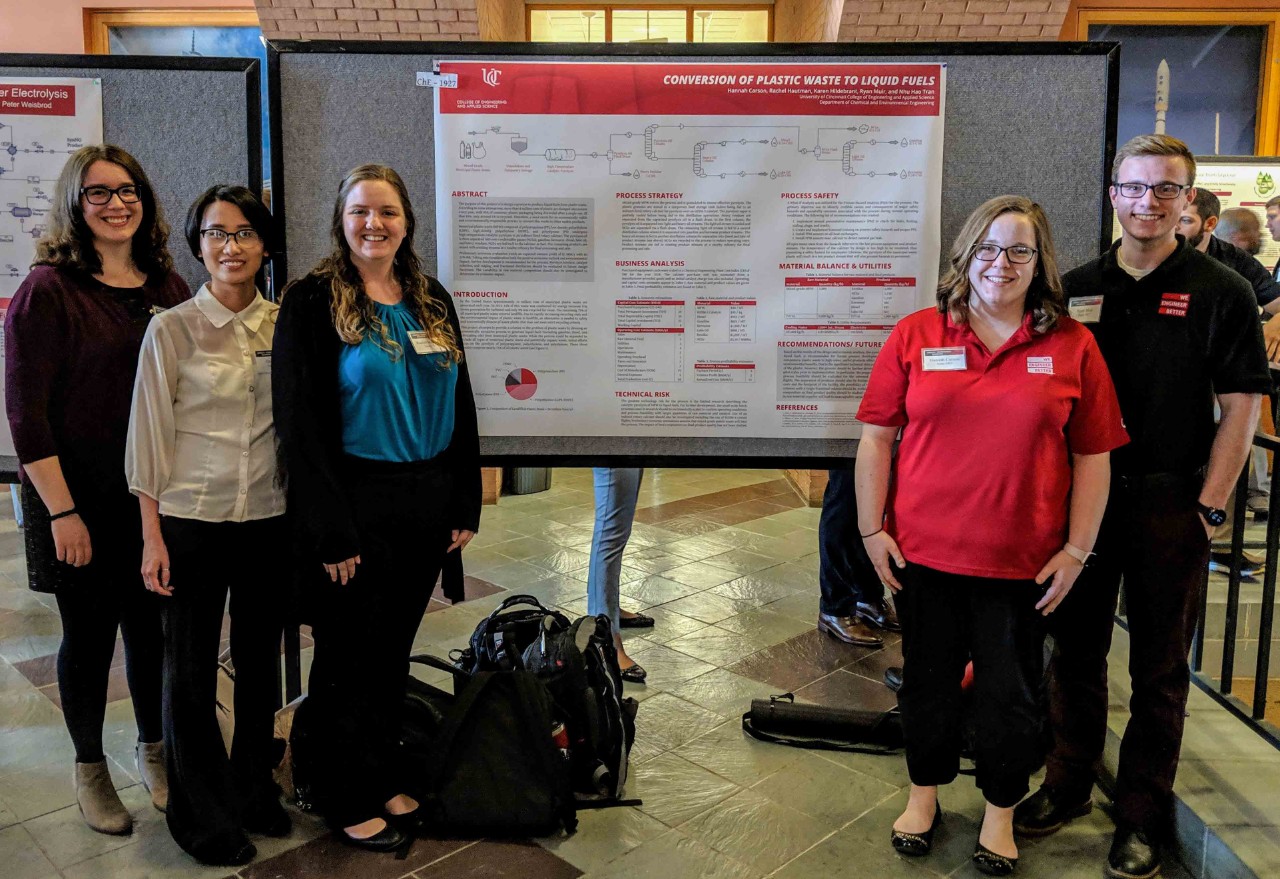
UC students present way to convert plastics to fuel
The United States recycles only 9 percent of its plastic. Everything else ends up in a landfill or the ocean. Students from the University of Cincinnati are trying to find a better place for all that plastic.
A team of UC chemical engineering students came up with a theoretical process that converts mixed-grade plastic to fuels such as diesel, gasoline and kerosene. They presented their work last week at UC's College of Engineering and Applied Science’s Senior Design Showcase and won the event’s Fan Favorite Award.
The students’ work reflect the innovation agenda platform of UC’s strategic direction, Next Lives Here.
The team wanted a process that could be universally applied to all plastic waste. They focused on mixed-grade plastic, which includes plastics like bags, water bottles and containers – just about all the plastic people use and throw out in the United States.
The team of UC chemical engineering students came up with a theoretical process that converts mixed-grade plastic to fuels like diesel, gasoline and kerosene. Image/Provided
"One of the big problems right now with recycling is it’s just very expensive, because you have to sort the plastic,” said Ryan Muir, a chemical engineering student on the team. “With this it’s not so important to do that.”
Instead of sorting the plastic, the team takes these different plastics and grinds them into flakes. The team feeds the plastic flakes into a heated reator with a catalyst that helps control the types of fuels that are made.
“You’re pretty much just taking the polycarbonate chains that are in plastics and breaking them down into smaller carbon chains like you would find in a crude oil,” said Muir.
The nice thing about this process is there’s hardly any waste. Everything we’re breaking down, we can sell.
Hannah Carson, UC chemical engineering student
The team then feeds this crude oil into several columns to separate it into different products. At the end, the team has five liquid fuels – diesel, lube oil, gasoline, kerosene and heavy residue – and one gas. The gas is recycled to heat the reactor and the process is repeated.
“The nice thing about this process is there’s hardly any waste,” said Hannah Carson, another chemical engineering student on the team. “Everything we’re breaking down, we can sell.”
The team proved that their process is commercially viable, with an estimated 11 percent return on investment. Companies typically like higher returns, but since it’s an environmental process, there’s some leeway.
The goal of the project, however, was more about increasing people’s understanding of recycling plastic than it was creating a process for market, said Muir
“There are other things you can do with plastics that we don’t think about. The whole project is building awareness for that and starting to think of new ways and new technologies for reusing plastic.”
Featured image at top: The United States recycles only 9 percent of its plastic. Everything else ends up in a landfill. Photo/Mali Maeder/Pexels

The team of UC chemical engineering students presents their poster. From left, Karen Hildebrant, Hao Tran, Rachel Hautman, Hannah Carson and Ryan Muir. Photo/Provided
Next Lives Here
The University of Cincinnati is classified as a Research 1 institution by the Carnegie Commission and is ranked in the National Science Foundation's Top-35 public research universities. UC's graduate students and faculty investigate problems and innovate solutions with real-world impact. Next Lives Here.
Related Stories
AI technology could change how potholes are repaired in Ohio
February 26, 2026
WLWT highlights a research partnership between the University of Cincinnati, Honda Motor Co. and the Ohio Department of Transportation to use new technology to monitor potholes, missing lane markings and other road issues to speed repairs.
UC welcomes new engineering faculty in three departments
February 25, 2026
The University of Cincinnati welcomed three new faculty members to the College of Engineering and Applied Science in January 2026.
Why do female caribou have antlers?
February 24, 2026
Researchers at the University of Cincinnati discovered that female caribou feed extensively on shed antlers they find while grazing to supplement their diet with important minerals they need to raise calves. This could explain why female caribou, unique among deer, have antlers.
